Top photo: As many as 300 inner-city children have fished on RISAA’s Take-A-Kid Fishing Day. Many have never seen the ocean before, never mind having taken a ride on a boat to fish.
The spirit of fishing
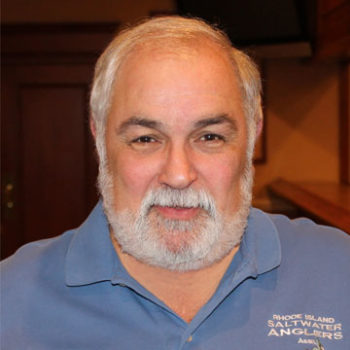
Steve Medeiros, president of the RI Saltwater Anglers Association since its inception over 20 years ago.
“Our first organizational meeting was in 1997. Fifteen of us came together, many of us belonging to local fishing clubs,” said Steve Medeiros, president of the Rhode Island Saltwater Anglers Association (RISAA).
“We realized that with fisheries management no club was advocating for fish and anglers, and we needed to be there. We chose to do this on a statewide basis. That’s why we selected a name that keyed in on Rhode Island rather than any one town or area,” said Medeiros.
The purpose of RISAA as a non-profit organization has not changed in over twenty years. The Association was created to provide a forum for recreational saltwater anglers, to educate members concerning fishing techniques, improved catches, and the overall enjoyment of fishing. RISAA aims to foster sportsmanship, support marine conservation and the sound management of fisheries resources. RISAA provides members with a unified voice to preserve and protect the rights, traditions and the future of recreational fishing.
Don Smith, expert angler and RISAA founding board member said, “We founded RISAA to focus more on family fishing and to educate anglers, both youth and adults. That’s why we have a lot of programming for youth. I personally wanted to see our fisheries preserved… I do not believe in killing fish if it is going to harm the species, so there was a real need to educate the fishing public, and that is a role RISAA took on.”
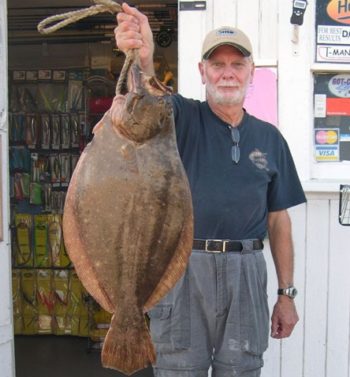
Don Smith, a RISAA founding board member with a 15-plus pound summer flounder he caught off Block Island.
From the start the association was successful and in the first year grew to 1,000 members. The group had to move its monthly meeting from a local Yacht Club to an Elks Club to accommodate members that wanted to attend monthly seminar meetings.
Today RISAA is one of the largest fishing clubs of its type in the Northeast, representing over 7,500 anglers and 28 affiliated organizations including environmental organizations, educational institutions and fishing clubs in Connecticut, Massachusetts and Rhode Island. About 125 to 225 people attend each RISAA monthly meeting.
Steve Medeiros said, “I think one of the reasons why we were so successful is that we offer members a variety of programs. It’s not just about fishing lectures and an annual banquet. We have had as many as 21 different committees.” RISAA committees are like clubs within a club. For example, the kayak committee has 107 members, and the fly fishing committee has 97 members.
Learn-how-to-fish seminars are held monthly with fishing instruction of all types, plus the group hosts social events, ball games and hockey trips, special member fishing trips and tournaments.
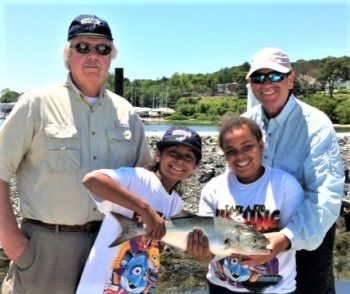
Over 250 RISAA volunteers are needed to run your average Take-A-Kid Fishing Day and about 50 volunteers are needed to run its three-day camp program for youth. Children shown with bluefish.
“We are dedicated to youth and have held ‘Take-a-Kid Fishing’ for 20 years. We take inner city youth fishing. Some have never see the ocean, never mind have gone on a boat and fished,” said Medeiros. Over the years Take-A-Kid Fishing has taken as many as 300 children fishing in one morning with 250 boat and shore volunteers working to make the day possible, providing a fishing experience and a shore cookout at noon for all.
The Rhode Island Saltwater Anglers Association also sponsors the annual New England Saltwater Fishing Show. This year, the three-day show had a record breaking 450 booths, 500 manufacturers and over 16,000 people attending. It has been praised by regional media as the best fishing show in the Northeast.
“Another milestone for RISAA was the formation of the Rhode Island Saltwater Anglers Foundation in 2004,” said Medeiros. The mission of the nonprofit 501(c)(3) foundation is to preserve marine fisheries, sponsor educational and public awareness programs, and promote environmental protection and restoration.
The foundation has sponsored a three-day youth fishing camp for the past three years, held Take-A-Kid Fishing Day, built fish ladders, supported eel grass planting and restoration programs, provided for a variety of fisheries research projects and sponsored a comprehensive scholarship program. The scholarship program has provided hundreds of high school-aged youth with college scholarships as well as continuing education in the marine fisheries, biology and environmental areas.
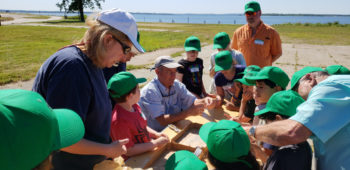
Children ages 7 to 12 learn how to tie knots at RISAA’s Youth Fishing Camp. Fifty children attend each session and spend two-thirds of their time fishing from shore, on a party boat and on a private vessel.
RISAA has also provided an open forum to discuss controversial recreational fishing issues that get the attention of fish managers, anglers of all types and recreational fishing media, as well as state and federal elected officials. The forum is called the Southern New England Recreational Fishing Symposium and takes place every two years. The symposium attracts national speakers including top scientific and academics from fisheries universities, fisheries leaders from NOAA and northeast state fisheries management. The topics have included “economic impact of recreational fishing,” “abundant fisheries and ecosystem-based management,” and last year the symposium topic was the “Magnuson-Stevens Act and how to make it work better for recreational fishing.” Last year’s symposium was in part sponsored by the Marine Fish Conservation Network and Sea Grant in Rhode Island.
Steve Medeiros and the entire RISAA organization have worked hard and long to advance recreational fishing in Rhode Island and the region. RISAA members have educated anglers and the public about the importance of recreational fishing and the economic impact it has in the region and the United States.
When asked about why he has dedicated so much of his life to recreational fishing, Steve Medeiros said, “We believe in what we are doing. The spirit of fishing, that’s why we do what we do.”

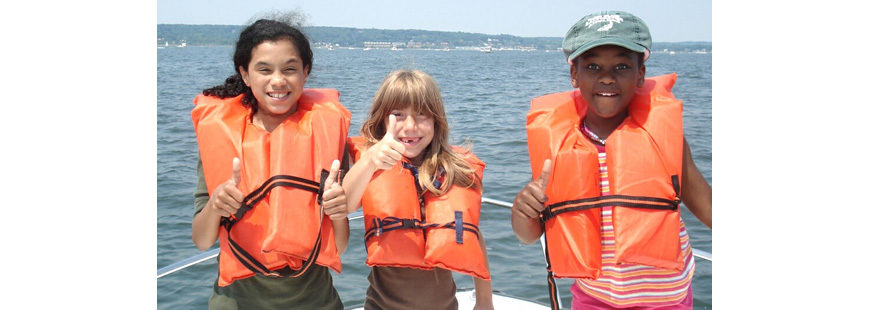

excellent article. RISAA is all that’s good with the fisheries. If we could move all draggers, gill nets and fish traps out past three mile limit the Northeast would be as good as Florida and the Gulf for recreational fisheries. Recreational fisheries could bring in far more money than commercial fisheries if only the politicians could realize this and get the commercial industry out of their pockets the Northeast fisheries would be a paradise.